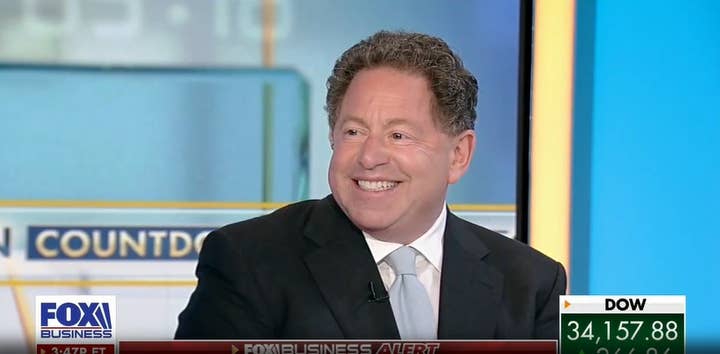Kotick will reportedly remain as Activision CEO if Microsoft deal falls through
Report also claims publisher sees UK regulator as the "only real potential roadblock" to $69 billion acquisition
Sign up for the GI Daily here to get the biggest news straight to your inbox
Bobby Kotick will reportedly retain his position as CEO of Activision Blizzard if the proposed acquisition by Microsoft is blocked by regulators or scrapped altogether.
Sources familiar with the matter told Fox Business that even if the $68.7 billion deal falls through, Kotick "will absolutely remain at the gaming giant to run the company."
It's unclear what will happen to Kotick if Microsoft does acquire Activision Blizzard. There were reports around the time of the deal's announcement that the Xbox firm had confirmed it would retain Kotick, while other reports expected him to leave – receiving a $15 million payout if he was fired.
In April 2022, Activision Blizzard said it had not discussed Kotick's future after the merger.
In many similar cases, a CEO stays in positional period for one or two years before stepping down and leaving the company.
Kotick has been CEO of Activision since 1991 and oversaw the merger with Vivendi Games that formed Activision Blizzard.
The Fox Business report follows Kotick's appearance on the TV network's show, in which we was quizzed about the potential opposition from key regulators such as the US Federal Trade Commission, the European Commission and the UK's Competition and Markets Authority.
In its subsequent report, Fox Business' sources said Activision Blizzard views the CMA as the "only real potential roadblock" to the Microsoft deal going through, and remains confident the two games companies will convince the UK regulator that such a merger will not harm competition.
The CMA posted its provisional findings of its phase two investigation into the deal, believing that Microsoft's ownership of Activision Blizzard could harm both competition and gamers.
It suggested several potential remedies, including Activision Blizzard selling the Call of Duty brand.
During the TV interview, Kotick said regulator worries about Call of Duty becoming exclusive to the Xbox ecosystem was "not a fair concern at all," and repeated his stance about these bodies lacking understanding about the industry, as expressed in a CNBC interview last week.
He added that there was "nothing proprietary" about the concept of Call of Duty – military simulation first-person shooters exploring conflicts in various time periods and settings from the past century – and suggested Sony has the resources to create a competitor if it wanted to.
The host suggested they expected Sony would be in contact with Activision Blizzard, seeking assurances that Call of Duty would still be available for PlayStation.
Kotick replied: "It's funny, Sony is not on the phone to us – in fact, they're not returning our phone calls. One of the things that's surprising to us is that this is the time where ordinarily we would be talking about the future and new opportunities for partnership, and they just haven't been returning our phone call. So I don't know that we're as valuable as maybe they've represented to the regulators that we are."
Despite the CMA's statements last week, analysts said they expect the merger is close to approval.

